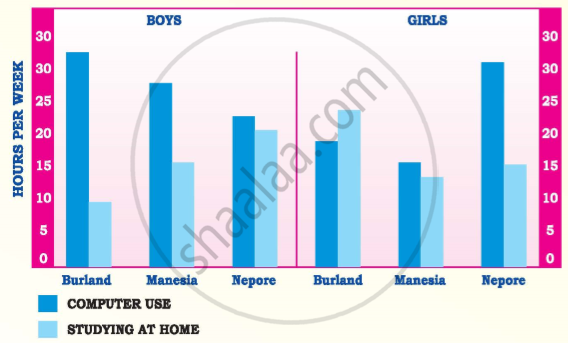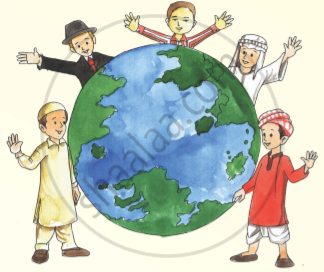Advertisements
Advertisements
प्रश्न
Rearrange the following words and phrases to form meaningful sentences. The first one has been done for you as an example.
was/ about twenty / childhood / delight / years ago.
Childhood was a delight about twenty years ago.
(a) the leisure hours/of a child/ of the TV / today / are spent / in front
________________________________________________
(b) of most / now – a – days / the attitude / parents is / different
________________________________________________
(c) work and play / different things / they see / as / two
________________________________________________
(d) playing / feel / is a / waste of / they / time / that
________________________________________________
उत्तर
(a) the leisure hours/of a child/ of the TV / today / are spent / in front
Today the leisure hours of a child are spent in front of the TV.
(b) of most / now – a – days / the attitude / parents is / different
Now-a-days the attitude of most parents is different.
(c) work and play / different things / they see / as / two
They see work and play as two different things.
(d) playing / feel / is a / waste of / they / time / that
They feel that playing is a waste of time.
APPEARS IN
संबंधित प्रश्न
Answer the following question briefly
Could the grandmother succeed in accomplishing her desire to read? How?
Answer the following questions:
‘I make the netted sunbeam dance’. What does ‘the netted sunbeam’ mean? How does it dance?
Answer the following question.
Explain the ending of the song.
Working in groups of four, write a dialogue between
• A tiger behind bars and a man
• A man in a cage and a tiger.
Look at the following pair of sentences. Underline the modals and discuss why each one is used in that sentence.
e.g.
I must not take those pills. (I’m not allowed.)
I need not take those pills. (It is not compulsory but I may if I wish.)
(b) I needn’t go to the meeting if I don’t wish to.
2. (a) I can swim a length of the pool.
(b) I can swim in the pool on Saturdays.
3. (a) You ought to get a nice present for her.
(b) You have to get a nice present for her.
4. (a) Can I go to the toilet?
(b) May I be excused?
5. (a) I may come tomorrow if I have the time.
(b) I might come tomorrow but it’s going to be difficult.
Did you know?
Modals are a small group of verbs that are used to express possibility,
probability, capability, capacity, ability, obligation and predictions.
Some of the modals you learnt in this unit are
can
may
shall
could
might
should
Need, dare, had better are also modals.
Understanding Modals:
Modal Auxiliaries
A modal verb or auxiliary verb is a verb, which modifies another verb, so that
the modified verb has more intention in its expression. In essence the modal
verb expresses modality, the way in which something is being said.
The main modals are
Can: could; may: might; shall: should; will: would: must; ought to; need to;
have to.
The negative modals are
Couldn't; wouldn't; shouldn't; mustn't; needn't; oughtn't/ ought not to
| Modal | Examples | Uses |
| Can/ can't |
She can read and write It can rain today Can I borrow your pen? Can you lend me your notes? Can I carry your books? |
ability possibility /probability seeking permission request offer |
| Could/ couldn't |
Could I borrow your book? Could you please help me with this sum? We could go for a picnic on Sunday I think you could come first this time There was a time when I could work round the clock. |
seeking permission request suggestion possibility/ probability past ability |
| May |
May I have some water? May I help you? May I shut the door? India may become a super power by 2020. May God bless you |
request offer permission possibility/ probability wish/ desire |
| Might | They might sell their house as they need the money. | future possibility/ probability |
| Will /Won't |
It is very cold so I will stay at home. I will help you if you wish. Will you look after my dog for a day? It will rain tonight. I will get you a shawl from Srinagar. |
intention offer request prediction promise |
| Would/Wouldn't |
Would you mind if I come over tonight? Would five o'clock suit you? Yes it would. Would you pass the salt? Would you come to my party? Would you prefer tea or coffee? |
permission making arrangements request invitation preference
|
| Shall |
Shall I help you? Shall we meet at 3.00 pm outside Bakshi Stadium? |
offer making arrangements |
| Should |
We should check the timings of the train. You should listen to the advice of your elders. |
recommended action advice |
| Ought to |
You ought to do your duty. The bus ought to be here any minute |
advice probability |
| Must/mustn't |
We must make a move now. You mustn't tell lies. |
obligation necessity |
| Need |
He need not go to the market. You need to lose weight. I need to get the groceries. |
necessity compulsion insistence |
Answer the following question by ticking the correct option.
The Manor House stood out because of its _______________
Study the following graph and the accompanying report.

Our study of the time spent by students at the computer and studying at home in three countries has revealed some interesting facts.
First, the majority of boys and girls in the age groups of 14-16 in these countries spend more time at the computer than studying at home. Children in these countries spend an average of20-30 hours per week in comparison to 10-15 hours of studying at home. The only exception is Burland where girls spend more time studying at home than at the computer.
Secondly it is evident that in all three countries, time spent at the computer is having a serious impact on the number of hours spent studying at home. In fact, the greater the number of hours spent at the computer, the fewer number of hours are being spent studying. For example, boys in Burland spend an average of 32 hours at the computer while they spend about 8 hours studying at home.
The following are the lyrics of a famous song. Complete it by filling in the missing letters (mostly vowels).
There c_m_s a time.
When we h __ d a certain call
When the w __ ld must come t_g_th_r
As one
There are p _ _ple d_ing
Oh and it's time
To l_nd a h_nd to l_fe
The gr __ test gift of all
Wec_n't go on 
Pr_t_nding day by day
Th_t s_me_ne, somewhere
Will s __ n make a change
We are all a p __ t of
God's gr __ t big f_m_ly
And thetr_th,youknow
L_ ve is all we n __ d
W_ are the world
We are the ch_ldr_n
We are the _nes
To m __ e a br ___ ter day
So l_t's st __ t g_ving
There's a ch __ ce we're m_king
We're s_ving our own l_ves
It's tr __ wemake a b_tterday
J_st y __ andme
W _11, send them your h __ rt
So they kn__ that s_me_ne cares
And th __ r lives wll be str_nger
And fr __
As G_d has sh_wn us
By t __ ning stone to br __ d
And so we _11 must
L-nd a h_lping h_nd
We are the world ...
We're d_wn and __ t
And there s __ ms no h_pe at all
Butify __ justbel __ ve
There's no w_y we can f_ll
Ohyes, let's r __ lise
That ch_nge can only c_me
When we st_nd t_g_ther
As one
We are the world ...
Grandmaster Koneru Humpy is visiting your school and you, as the Sports Captain, have to introduce her in the school assembly. With the help of Question 2, write out the Bio-sketch.
20 years from now, one of your class-mates becomes a famous sport-star. You have been asked to write his/her biography. Collect the necessary biographical details. Use your imagination to create his / her achievements in the sport concerned, and write the biography. Remember to write it in chronological order of events, and use the simple past tense as far as possible.
